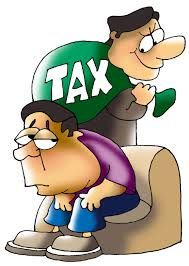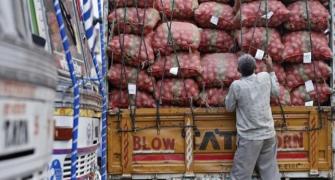
Both Prime Minister Narendra Modi and Finance Minister Arun Jaitley were eager to get the GST Bill passed as according to an estimate, Indian economy will gain $15 billion a year if the GST is implemented.
Goods and Services Tax, which got passed in the Rajya Sabha on Wednesday, is expected to unify the nation and make it an attractive destination for foreign investments.
The tax, however, still faces many challenges and one that stands out is with the issue of administrative control over assessing companies, yet to be ironed out between the Centre and the states.
The obvious question that arises: what is GST all about and how will it impact us? We present here a brief fact sheet.
What is this GST all about?
Goods and Services Tax -- GST -- is a comprehensive tax levied on manufacture, sale and consumption of goods and services at a national level.
Through a tax credit mechanism, this tax is collected on value-added goods and services at each stage of sale or purchase in the supply chain.
The idea of GST was first mooted by the Vajpayee government when it set up the Asim Dasgupta Committee to study the feasibility and the subsequent implementation of a new form of indirect tax.
Vajpayee government went out of power in 2004 and a new coalition, United Progressive Alliance, took over the reins. During 2007-2008 Budget, Palaniappan Chidambaram, then Union Finance Minister, announced that GST would be introduced from April 1, 2010.
Chidambaram also said that the Empowered Committee of State Finance Ministers, on his request, would work with the central government to prepare a road map.
The GST Constitutional Amendment Bill, which was introduced in the Lok Sabha by the UPA government in 2011, has lapsed and so the Modi government had to come up with a fresh Bill.
The GST could not be implemented till now as many states and several political parties were opposing it.
Why were the states nervous about GST?
States were nervous about the GST as they thought the Bill does not address their concerns over entry tax and taxation of petroleum products.
Initially, it was decided to keep petroleum products out of the purview of GST.
But in the wake of states' opposition, a revised draft of the Constitution amendment Bill put petroleum, though zero-rated, under GST because it is an input product.
GST, a value-added tax, gives credit for taxes paid on inputs. The states argued that if petroleum is kept out, it will break the chain for input credits.
Also, for the tax to be implemented, the Constitution had to be amended and a consensus needed to be reached with the states.
The states objected to the Constitutional Amendment Bill as it did not contain provisions for giving states compensation against any possible loss of revenue after GST roll-out for five years.
One of the main concerns of the states was the cumulative revenue loss that they will suffer once Central Sales Tax is removed.
Since CST is levied by the Centre on the inter-state movement of goods and is collected by the states, the latter were demanding suitable compensation.
Finance Minister Arun Jaitley said the Centre has allowed states to levy one per cent additional tax on inter-state trade for a period of two years.
The Centre has also agreed to compensate the states for revenue loss arising out of GST implementation for a period that may extend up to five years.
What are the benefits of GST?
Under GST, the taxation burden will be divided equitably between manufacturing and services, through a lower tax rate by increasing the tax base and minimising exemptions.
It is expected to help build a transparent and corruption-free tax administration. GST will be levied only at the destination point, and not at various points (from manufacturing to retail outlets).
It is estimated that India will gain as implementation of GST would promote exports, raise employment and boost growth.
In the GST system, both central and state taxes will be collected at the point of sale. Both components (the central and state GST) will be charged on the manufacturing cost.
This will benefit individuals as prices are likely to come down. Lower prices will lead to more consumption, thereby helping companies.
Will this be an extra tax?
GST will not be an additional tax. CGST will include central excise duty (Cenvat), service tax, and additional duties of customs at the central level; and value-added tax, central sales tax, entertainment tax, luxury tax, octroi, lottery taxes, electricity duty, state surcharges related to supply of goods and services and purchase tax at the State level.
The tax-rate under the proposed GST would come down, but the number of assesses would increase 5-6 times.
Why do we need GST when we already have value added tax?
VAT regulations and rates generally vary across states. States at times undercut rates to draw investors.
This leads to a loss of revenue to both the state and the Centre. GST would introduce uniform taxation laws across states and different sectors.
Will goods and services cost more post GST?
No. In short term, it may lead to higher inflation rates. But prices are expected to fall in the long term as dealers might pass on the benefits of the reduced tax to consumers.
Are there any drawbacks to GST?
According to A K Bhattacharya, Editor, Business Standard, far from creating a barrier-free pan-Indian market for smooth transaction of goods and services across the country, the GST system may well create new tax hurdles.
Instead of improving tax compliance, there could be a strong incentive for tax payers to avoid the higher tax burden to be imposed by the new system, Bhattacharya wrote in one of his recent columns published in Business Standard.
The tax base too may not widen because of the many items that would be excluded from the GST chain, he said.
And, most important, instead of enhancing the value of the country's economic activity, the proposed GST system may well be a dampener for achieving higher growth in gross domestic product.
GST is likely to have a negative impact on small businesses, especially those in the Micro, Small and Medium Enterprises sector.
The fear is that once GST is implemented, they will end up paying more tax than ever, which may force them to shut shop. Needless to add, MSME sector is an important contributor to the growith of India's GDP.
What are the items on which GST may not be applied?
The GST is likely to exclude potable alcohol, tobacco etc.
Why is the Modi government so keen on GST?
Both Prime Minister Narendra Modi and Finance Minister Arun Jaitley were eager to get the GST Bill passed as according to an estimate, Indian economy will gain $15 billion a year if the GST is implemented.
With globalisation, it is necessary that India's economy aligns with the best international practices. And this is where an efficient taxation system is a must. An inclusive tax system like the GST may be the answer.
Illustration: Uttam Ghosh/Rediff.com








